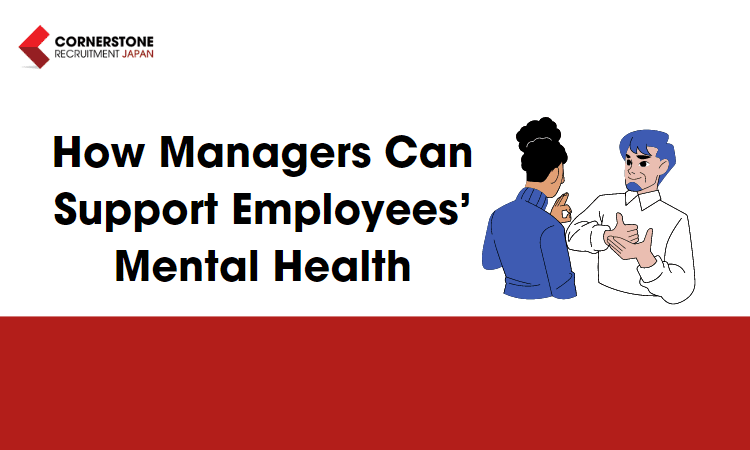How Managers Can Support Employees’ Mental Health
over 2 years ago by
Managing a team is more than guiding the team members and delegating tasks to generate the desired results. The central aspects of giving your employees a healthy work environment and supporting the team’s mental health are tied to the team management function.
Here is our list of strategies for doing this, curated by our group company of expert consultants.
1. Understand the Factors Causing Workplace Stress
An optimum level of stress is good and leads to enhancing organisational performance. But considering the increasing levels of workplace stress, there is a pressing need to check and control the factors instigating stress at work. While minor to significant issues could increase stress levels, the most prominent are excessive workload, non-cooperative seniors, unhealthy work environments, and below-average learning opportunities.
2. Give Employees Space to Pause & Seek Support
Organisational health and employees’ mental health run alongside and are inseparable. The need of the hour is to make employees feel supported and give them enough space to seek support after a required pause.
Expect situations to change that may lead to employees requiring a breather.
3. Encourage Employees to Take Earned Vacation or Paid Time Off
Spending some time away from work can refuel employees’ productivity and motivation. Leaders and managers can encourage their people to take some time off and release them from the guilt of requesting genuine leaves.
Alternatively, managers could consider organising team events for recreational purposes.
4. Normalise Mental Health Talks
Let’s face it; no one wants to talk about mental health. But regardless, the stigma attached to having conversations around mental health should be discarded. If organisations cannot encourage employees to have a heart-to-heart talk about mental health, their people will keep doubting their self-sufficiency and develop more severe symptoms.
“Employers that provide mental health and counseling benefits create a stronger social bond and engender greater employee loyalty.”
5. Check-in on the Team Members Regularly
Asking your team members about their health and family is the firmest step you can take towards ensuring employees’ good mental health. While they might not share if anything is wrong with them, you can still tell them they have someone who is all ears.
Additionally, managers can identify an effective way to extend employee mental health support to remote employees.
6. Practice Transparency
Managers must inform their people sufficiently, be it the micro-tasks that cater to an employee’s daily work schedule or meeting with the CEO. From a practical viewpoint, a lack of agenda for tasks, irrespective of their nature, can cause unnecessary anxiety among the team members. Ensure your people know what you expect from them in a particular situation or a meeting.
7. Be Inclusive
Present-day managers cannot afford to overlook the importance of being accommodating and offering flexibility. As a manager, educate yourself about what’s happening in your people’s lives and support them in the required manner. For instance, you can offer flexible working hours (of course, not at the cost of the organisation’s goals) to team members having childcare responsibilities or ailing parents to look after. Be generous and realistic to the safest extent.
8. Promote Mental Well-being Throughout the Company
Invest in building an open culture that supports the organisation’s idea of prioritizing mental health over other factors. Spread the word and make every employee know you treat mental health on the same terms as physical health. Also, have policies and strategies in place to ensure support to the team members.
9. Set Reasonable Expectations
It’s important that managers recognise the employees who might be struggling and have a one-on-one with them. Engaging them in healthy conversations and guiding them on how the organisation and its policies can mend the situation and improve their psychological state. And the best person to remove stress by setting reasonable expectations is a manager.
Team support will, thus, follow to ensure the good mental health of the employees across the organisation.
10. Support Employees’ Pursuits of Fun
Make sure your employees take some time out for fun. For example, encourage them to utilise coffee breaks to interact with one another on non-work related topics. Besides, managers can ask them to list their preferred activities for fun outside work.
Implementing a well-being program
As the number of employees suffering from mental illnesses increases due to changes caused by the pandemic, the need for accessible healthcare is paramount. To address this issue, digital healthcare tools offer several apps to scale up treatments. EAPs, well-being webinars, flexible benefits, and mental health training are current solutions many organisations have in place.
Although digital mental health solutions provide a great alternative for maintenance and preventive care, one-to-one clinical therapy will still be essential to mental health management.
Before deciding which digital solution to invest in, employers should reflect on their objectives and employees’ characteristics and preferences.
Here is a checklist of what you can do to implement a future-proof mental well-being program:
Determine your objectives and how to achieve and measure their success.
Adopt a holistic well-being pathway that meets your organisation’s objectives by engaging a wellness consultant.
Collect feedback from your employees through focus groups and engagement surveys.
Engage a wellness consultant to help plan your well-being framework for the year
Conclusion
“The workplace is often the most stressful place a person finds themselves in; employees and managers need to watch for signs of deteriorating mental health in fellow colleagues.”
The only silver lining to building a stress-free workplace is ensuring the continuous provision of employee mental health support. Opportunely, in the end, your people will always remember how you cultivated a healthy work environment that reflects their loyalty towards the organisation.
Contact the most dynamic team of specialist recruitment consultants to hire highly skilled professionals. We are just a click away.
This article is originally published by CGP Singapore and edited by Cornerstone Recruitment Japan.
